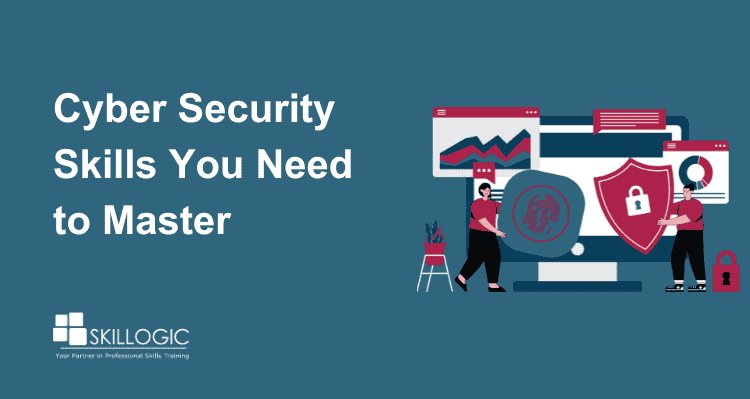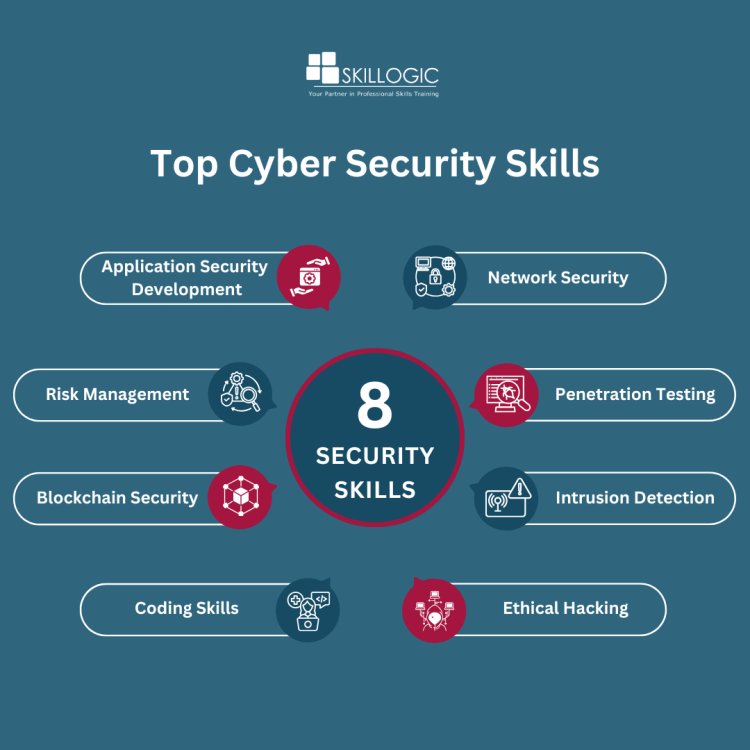Top Cyber Security Skills You Need to Master

Amid the rapid advancements in technology, Cyber Security has risen as one of the most essential and crucial domains. With cyber threats increasing at an alarming rate, the demand for skilled Cyber Security professionals continues to rise. This blog post delves into the top 8 cyber security skills that you need to master to thrive in this dynamic field. Whether you are a newcomer seeking a top Cyber Security course or an experienced professional looking for Cyber Security training, this guide will provide you with valuable insights.
Overview of Cyber Security: The Backbone of Digital Safety
Cyber Security is more than just a trending topic; it is a critical practice essential for protecting sensitive data from unauthorized access and attacks. As reliance on digital technologies grows, the significance of robust Cyber Security measures becomes increasingly apparent. From individual users to large multinational corporations, everyone is a potential target for cybercriminals. Data breaches can lead to significant financial losses, harm to reputation, and legal consequences. Consequently, developing comprehensive Cyber Security strategies is vital for both organizations and individuals. By safeguarding data, Cyber Security ensures the integrity and functionality of crucial systems, making it a fundamental aspect of our daily lives.
The demand for Cyber Security professionals is skyrocketing, with numerous reports indicating a significant shortage of skilled workers in the field. Organizations across various sectors are actively seeking qualified individuals to protect their digital assets and maintain compliance and regulations, making Cyber Security one of the most lucrative career paths available today. As technology continues to advance, the need for effective Cyber Security measures will only increase, further highlighting the importance of Cyber Security.
The scope of Cyber Security is extensive, covering multiple domains such as information security, network security, and application security. This diversity allows for a wide range of career opportunities that cater to different interests and skills. From technical roles like security analysts and ethical hackers to managerial positions focused on risk assessment and compliance, the array of opportunities in Cyber Security is vast and promising, offering a rewarding career for those willing to pursue it.
Refer these articles:
- Ransomware Attacks: How to Protect Your Organization
- Zero Trust Architecture: The Future of Cybersecurity
- 10 Essential Cyber Security Tools for Beginners
How to Develop Your Cyber Security Skills?
Let’s dive into the essentials of honing your Cyber Security skills. In a field as dynamic as Cyber Security, continuous improvement is not just beneficial—it's essential for success.
Pursuing Education and Certifications
Enhancing your Cyber Security skills begins with formal education and certifications. Enrolling in a top Cyber Security course provides foundational knowledge in critical areas like network security and ethical hacking. Certifications such as CompTIA Security+, CISSP, and CEH validate your expertise and boost your appeal to employers.
Gaining Hands-On Experience
Practical experience is essential. Internships and entry-level positions let you apply your skills in real-world settings, while Cyber Security competitions and capture-the-flag (CTF) events sharpen your problem-solving abilities. Contributing to open-source projects offers valuable insights and showcases your contributions.
Networking and Continuous Learning
Networking is vital for professional growth. Engage in industry conferences, webinars, and local meetups to connect with fellow professionals. Additionally, join online forums to stay updated on trends. Lastly, commit to continuous learning by following industry publications and pursuing additional certifications to remain competitive in the field.
Refer these articles:

Top Cyber Security Skills
In an era where cyber threats lurk around every corner, mastering specific skills in Cyber Security is essential for anyone looking to thrive in this field. Let’s dive into the top Cyber Security skills that can empower you to safeguard information and tackle today’s evolving challenges with confidence!
1. Application Security Development
Application security is a critical area within Cyber Security that focuses on protecting applications from vulnerabilities throughout their lifecycle. As businesses increasingly rely on web applications, understanding how to secure them becomes paramount.
To develop skills in application security:
- Learn Secure Coding Practices: Familiarize yourself with secure coding techniques to prevent common vulnerabilities such as SQL injection and cross-site scripting (XSS).
- Understand Application Development Frameworks: Knowing various frameworks can help you better understand potential weaknesses.
Moreover, familiarity with tools such as static and dynamic analysis software can further enhance your ability to secure applications.
2. Network Security
Network security involves the protection of networks from breaches, intrusions, and other malicious activities. It encompasses hardware and software technologies that work together to safeguard sensitive data and maintain network integrity.
To excel in network security:
- Understand Network Protocols: Familiarize yourself with protocols like TCP/IP, HTTP, and SSL/TLS, as they are fundamental to network communications.
- Learn to Use Firewalls and VPNs: Knowing how to configure and manage firewalls and virtual private networks (VPNs) is essential for safeguarding networks.
Additionally, becoming proficient in intrusion detection systems (IDS) can enhance your ability to monitor and respond to threats.
3. Risk Management
Risk management is a crucial aspect of Cyber Security that involves identifying, assessing, and mitigating risks associated with information assets. By mastering risk management, you can help organizations make informed decisions regarding their Cyber Security posture.
To develop skills in risk management:
- Study Risk Assessment Frameworks: Familiarize yourself with frameworks such as NIST, ISO 27001, or FAIR, which provide guidelines for risk assessment and management.
- Conduct Vulnerability Assessments: Learning to perform regular vulnerability assessments helps identify potential weaknesses in systems and applications.
Furthermore, effective communication skills are vital in this area, as you'll need to convey risks and recommendations to stakeholders.
4. Penetration Testing
Penetration testing, also known as ethical hacking, involves simulating cyber attacks to detect weaknesses in systems. This proactive approach allows organizations to strengthen their defenses before actual attacks occur.
To excel in penetration testing:
- Learn Hacking Techniques: Familiarize yourself with tools and techniques used by malicious actors to identify potential weaknesses.
- Practice Using Penetration Testing Tools: Tools like Metasploit, Burp Suite, and Wireshark are essential for conducting effective tests.
Additionally, gaining experience in various environments, such as web applications and network infrastructures, can enhance your skills as a penetration tester.
5. Intrusion Detection
Intrusion detection focuses on monitoring network traffic and identifying potential threats. By developing skills in intrusion detection, you can help organizations respond swiftly to security incidents.
To enhance your intrusion detection skills:
- Understand Intrusion Detection Systems (IDS): Familiarize yourself with both host-based and network-based IDS, as well as their deployment.
- Analyze Network Traffic: Learn to analyze network traffic for anomalies and suspicious activities.
Moreover, understanding how to configure alerts and responses can significantly improve an organization’s incident response capabilities.
6. Ethical Hacking
Ethical hacking is a vital skill that involves identifying and exploiting vulnerabilities in systems to help organizations strengthen their defenses. Ethical hackers are often referred to as “white hat” hackers, as they operate with permission and for the benefit of the organization.
To become a proficient ethical hacker:
- Obtain Relevant Certifications: Certifications like Certified Ethical Hacker (CEH) or Offensive Security Certified Professional (OSCP) can enhance your credibility.
- Engage in Continuous Learning: The Cyber Security landscape is constantly evolving, so staying updated on the latest threats and techniques is crucial.
Additionally, joining online communities and forums can provide opportunities for collaboration and knowledge sharing.
7. Blockchain Security
As blockchain technology continues to gain traction across various sectors, understanding its security implications is essential. Blockchain security focuses on protecting decentralized networks and ensuring the integrity of transactions.
To master blockchain security:
- Learn the Fundamentals of Blockchain Technology: Understanding how blockchain works, including concepts like consensus algorithms and smart contracts, is essential.
- Explore Blockchain Security Best Practices: Familiarize yourself with best practices for securing blockchain networks, including private key management and cryptographic techniques.
Moreover, understanding regulatory compliance related to blockchain can further enhance your expertise in this emerging field.
8. Coding Skills
While not all Cyber Security professionals need to be expert coders, having a solid understanding of programming languages can significantly enhance your effectiveness in the field. Coding skills allow you to analyze scripts, develop cyber security tools, and automate tasks.
To improve your coding skills:
- Learn Relevant Programming Languages: Familiarize yourself with languages such as Python, Java, or C++, as they are commonly used in Cyber Security applications.
- Practice Writing Secure Code: Understanding secure coding practices helps prevent vulnerabilities in your applications.
Furthermore, engaging in coding challenges or contributing to open-source projects can enhance your coding abilities.
Refer these articles:
Essential Coding Languages for Cyber Security
To excel in coding, focus on these languages:
- Python: Commonly used for scripting and task automation.
- JavaScript: Important for understanding web vulnerabilities.
- C/C++: Useful for gaining insights into system-level programming and security.
Is Cyber Security a Good Career Choice?
Yes, a career in cyber security can be an excellent choice for several reasons:
Growing Job Market
The job market for Cyber Security professionals is booming. With a substantial number of organizations prioritizing Cyber Security, the demand for skilled individuals is higher than ever. Cyber Security jobs often come with competitive salaries and opportunities for advancement, making it an attractive career path.
Versatility and Job Satisfaction
Cyber Security offers a range of cyber security job roles, from technical positions to management roles, providing ample opportunities to find a niche that suits your skills and interests. Furthermore, the job is inherently fulfilling, as professionals contribute to making the digital world a safer place. The satisfaction of protecting valuable assets and information drives many individuals to pursue careers in this field.
In conclusion, mastering the top eight cybersecurity skills discussed in this post is crucial for anyone aiming to thrive in the field. As the demand for skilled professionals continues to grow, investing in your education through a Cyber Security training institute can set the foundation for a successful career. Whether you pursue formal courses or engage in self-study, developing these skills will empower you to meet the challenges of today's digital landscape effectively.
At SKILLOGIC Institute, we recognize the pressing need for small businesses to safeguard themselves in our digital age. Our Cyber Security Professional Plus Course is specifically designed to equip small business owners and their teams with the essential skills to navigate the unique security challenges they face. Accredited by prestigious organizations such as IIFIS and NASSCOM FutureSkills, this course offers comprehensive training through real-time projects and exclusive practice labs, ensuring participants gain invaluable hands-on experience in protecting their systems from potential threats.
With a vibrant community of over 100,000 learners, SKILLOGIC is committed to helping small businesses strengthen their Cyber Security measures through high-quality education and practical skills. Our emphasis on real-world applications and industry-recognized certifications establishes us as a trusted partner for small businesses looking to secure their operations and customer data. Join us to take proactive steps in mastering the top 8 Cyber Security skills necessary for protecting your business and ensuring its future in an increasingly interconnected world.

0
242